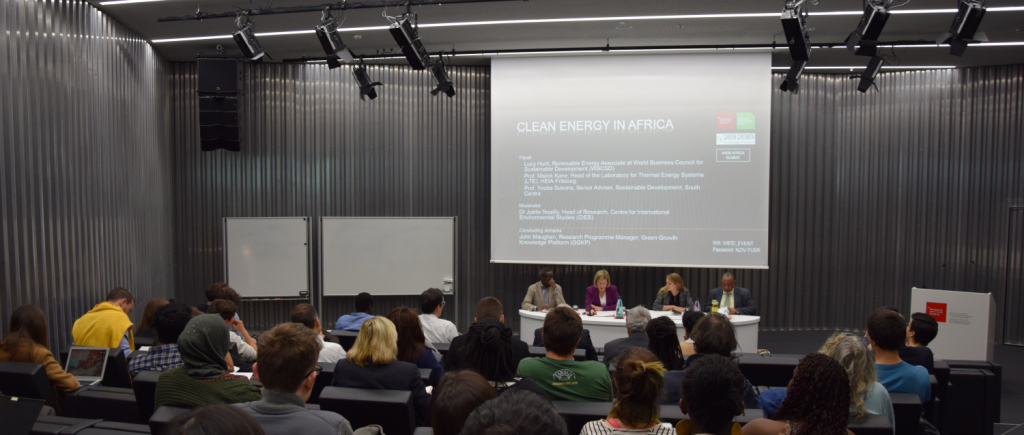Renewable technologies have the capacity to generate enough energy to power Africa and drive development. However, this achievement is contingent upon a series of technical and political factors. Energy must be clearly connected to development with policies and pathways determined by the local context and needs - rather than what appeals to donors. Most importantly, a long-term vision for clean energy on the African continent will require political will and cohesive policies.
On Monday 25th March, the Centre for Environmental Studies (CIES) in partnership with the Green Growth Knowledge Platform (GGKP) and the IHEID Africa Summit held a panel discussion on Clean Energy in Africa. The event featured Youba Sokona, Senior Adviser in Sustainable Development at the South Centre, Professor Malick Kane, Head of the Laboratory for Thermal Energy Systems (LTE) at the School of Engineering and Architecture of Fribourg, and Lucy Hunt, Renewable Energy Associate at the World Business Council for Sustainable Development (WBCSD). Dr Joëlle Noailly, Head of Research at the CIES and Lecturer in International Economics, served as moderator and John Maughan, Research Programme Manager for the GGKP, gave closing remarks.
The energy choices made in Africa today will have long-term consequences on its future economic development and environmental standing. There are plenty of opportunities today for Africa to take advantage of clean renewable energies - such as solar, wind or geothermal energy - which are developing very rapidly and becoming increasingly affordable.
As Professor Malick Kane indicated, with any type of renewable energy source, there is always the challenge of how to store excess energy during periods of low energy consumption and provide energy at peak demand. Addressing intermittency issues is a necessity in order to ensure both the effective use of this technology and that it provides the desired energy services. What became clear as the discussion unfolded is that clean energy encompasses more than just electricity generation, but all forms and use of energy, including cooling, heating, mobility and buildings.
Lucy Hunt pointed out that “the private sector is an important lever we should be pulling”. The purchasing power that businesses can bring to clean energy investment is significant. There are proven business models of low-carbon microgrids built by commercial and industrial companies and emerging innovative business models, such as systems where companies provide power to local communities or connect with other microgrids to create community or even regional scale grids. The Microgrid Hub, launched by WBCSD, showcases low-carbon microgrid projects across Africa and demonstrates the potential of this technology.
A number of companies have been successful in using innovative business models to harness clean energy across Africa, including Aceleron, a company that transforms waste batteries into lithium battery packs, and BBOXX, a pay-as-you-go solar business, both part of the Transforming Energy Access programme.
In the words of Mr Youba Sokona, in order for Africa to integrate clean energy technology into its infrastructure, it has to “deconstruct the narrative of energy”. Energy tends not to be treated as a means for development in Africa and electrification programmes often narrowly focus on lighting, rather than addressing higher on-the-ground priorities. This is an attitude that stymies development. Clean energy, cannot be seen as “a donor pet project” as Mr Sokona said.
Instead, the roll out of renewable energy must fit the context of its locality and be seen as a means for Africa to improve human well-being and ensure sustainable livelihoods. As the continent is rapidly urbanising, it has the opportunity to build its urban centres to be inclusive, energy efficient and climate-smart, rather than follow the pattern of many other regions in building fast and retrofitting later. An encouraging signal that John Maughan emphasised is that a few years ago the conversation would have been whether clean energy could be competitive, now it is how to roll out the technology and solutions faster.
A major issue standing in the path of clean energy and limiting its potential for development is that there is no cohesive policy addressing it and the actors involved – governments, private sector, cooperatives, citizens, etc. – work in silos, with limited cooperation and collaboration. The solutions are there, but transforming the energy narrative in Africa will require strong political will and engagement from governments.


